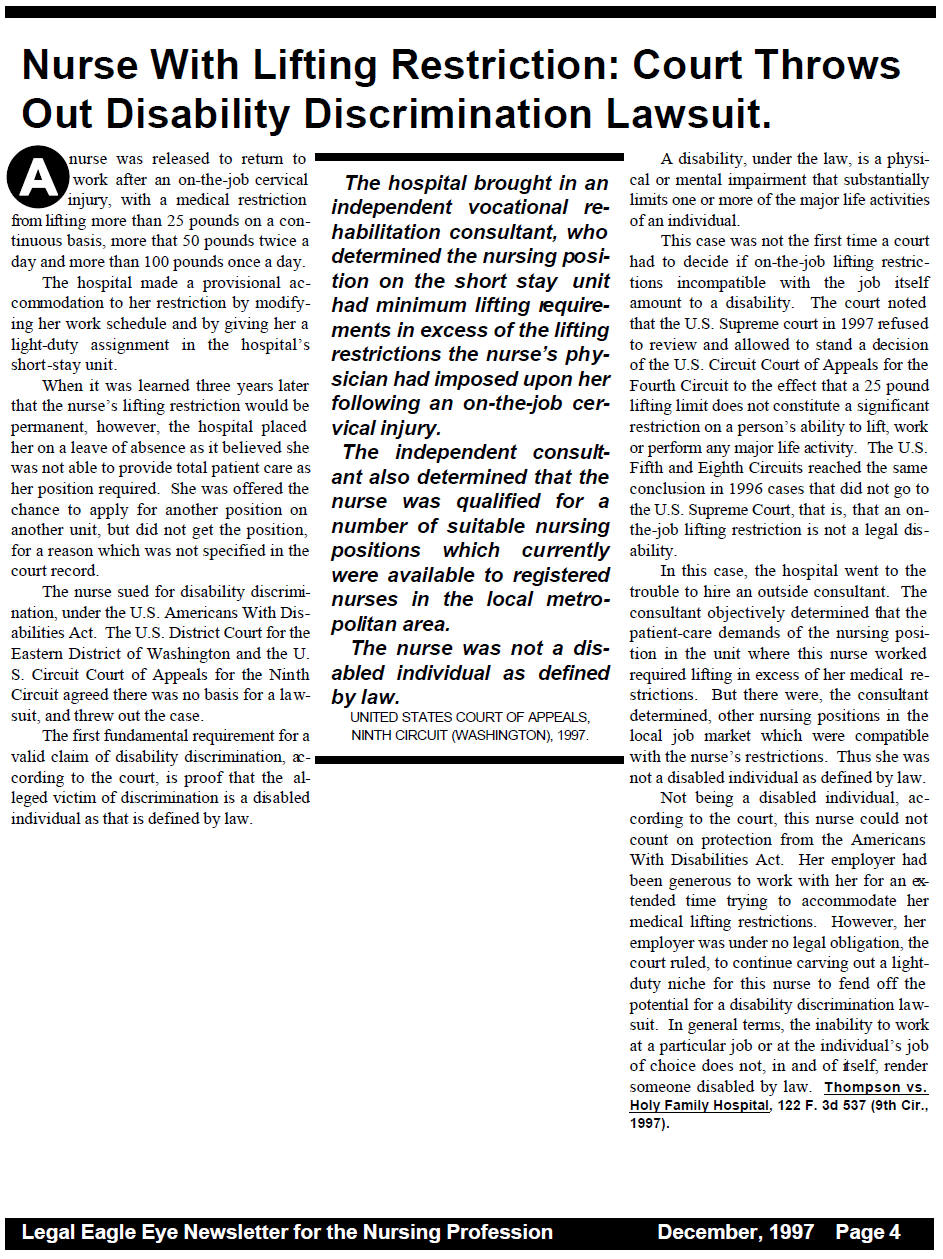
Legal Eagle Eye Newsletter for the Nursing Profession Home Page
New Subscriptions I About Our Newsletter I Sample Newsletter I FAQ I Contact Us

Nurse With Lifting Restriction: Court Throws Out Disability Discrimination Lawsuit
Quick Summary: A nurse being unable to do one specific nursing job does not mean the nurse is disabled or able to sue for disability discrimination.
The hospital in this case brought in an independent vocational rehabilitation consultant. The consultant determined the nurse's position on the short stay unit did require her to be able to lift in excess of the lifting restrictions the nurse's physician imposed on her after her on-the-job cervical injury.
However, the consultant also determined the nurse was qualified for a number of suitable nursing positions which were available at the time to registered nurses in the same local area.
Therefore, the nurse was not considered a disabled individual as defined by law.
UNITED STATES COURT OF APPEALS, NINTH CIRCUIT, 1997.A nurse was released to return to work after an on-the-job cervical injury, with a medical restriction from lifting more than 25 pounds on a continuous basis, more that 50 pounds twice a day and more than 100 pounds once a day.
The hospital made a provisional accommodation to her restriction by modifying her work schedule and by giving her a light-duty assignment in the hospital’s short-stay unit.
When it was learned three years later that the nurse’s lifting restriction would be permanent, however, the hospital placed her on a leave of absence as it believed she was not able to provide total patient care as her position required. She was offered the chance to apply for another position on another unit, but did not get the position, for a reason which was not specified in the court record.
The nurse sued for disability discrimination, under the U.S. Americans With Disabilities Act. The U.S. District Court for the Eastern District of Washington and the U.S. Circuit Court of Appeals for the Ninth Circuit agreed there was no basis for a lawsuit, and threw out the case.
The first fundamental requirement for a valid claim of disability discrimination, according to the court, is proof that the alleged victim of discrimination is a disabled individual as that is defined by law.
A disability, under the law, is a physical or mental impairment that substantially limits one or more of the major life activities of an individual.
This case was not the first time a court had to decide if on-the-job lifting restrictions incompatible with the job itself amount to a disability. The court noted that the U.S. Supreme court in 1997 refused to review and allowed to stand a decision of the U.S. Circuit Court of Appeals for the Fourth Circuit to the effect that a 25 pound lifting limit does not constitute a significant restriction on a person’s ability to lift, work or perform any major life activity. The U.S. Fifth and Eighth Circuits reached the same conclusion in 1996 cases that did not go to the U.S. Supreme Court, that is, that an on-the-job lifting restriction is not a legal disability.
In this case, the hospital went to the trouble to hire an outside consultant. The consultant objectively determined that the patient-care demands of the nursing position in the unit where this nurse worked required lifting in excess of her medical restrictions. But there were, the consultant determined, other nursing positions in the local job market which were compatible with the nurse’s restrictions. Thus she was not a disabled individual as defined by law.
Not being a disabled individual, according to the court, this nurse could not count on protection from the Americans With Disabilities Act. Her employer had been generous to work with her for an extended time trying to accommodate her medical lifting restrictions. However, her employer was under no legal obligation, the court ruled, to continue carving out a light-duty niche for this nurse to fend off the potential for a disability discrimination lawsuit. In general terms, the inability to work at a particular job or at the individual’s job of choice does not, in and of itself, render someone disabled by law. Thompson vs. Hospital, 122 F. 3d 537 (9th Cir., 1997).
More references from nursinglaw.com
http://www.nursinglaw.com/backinjury.htm
http://www.nursinglaw.com/backinjury2.htm
http://www.nursinglaw.com/back-problem-disability-discrimination.htm
http://www.nursinglaw.com/lifting1.htm
http://www.nursinglaw.com/lifting2.htm
http://www.nursinglaw.com/back-injury-patient-lift.htm
http://www.nursinglaw.com/lifting4.htm